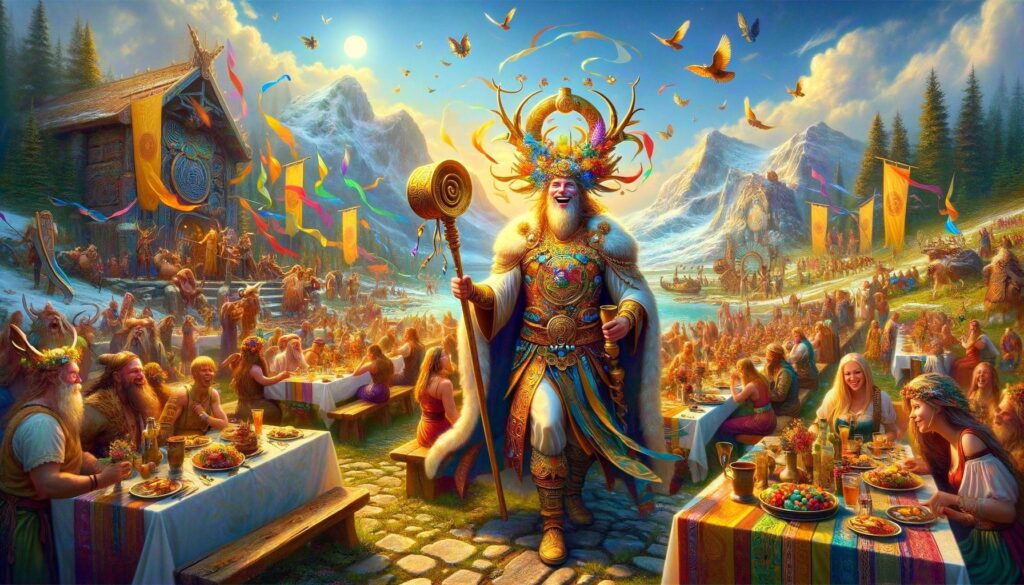Norse Goddesses, Norse Gods, Norse Mythology, Tales of the Gods
Who Is The Viking God Of Fun
In this article, we will delve into the fascinating world of Norse mythology and uncover the joy and merriment associated with the Viking god of fun. With its vast array of gods and goddesses, Norse mythology provides a glimpse into the cultural significance of celebrations and festivities in the Viking era.
What is Norse Mythology?
To understand the Viking god of fun, it’s essential to grasp the basics of Norse mythology. Norse mythology is a collection of myths and tales that the Vikings revered. These stories provided explanations for natural phenomena, celebrated heroes, and worshiped gods.
Overview of Viking Gods
Norse mythology is a treasure trove of fascinating deities that showcase the depth and diversity of Viking culture. From mighty warriors to cunning tricksters, each god and goddess possesses unique traits that shape the fabric of Norse mythology.
When exploring this rich pantheon, we encounter a multitude of viking gods, each with their own stories and significance. These gods play pivotal roles in shaping the world of the Vikings, from the creation of the cosmos to the daily lives of mortals.
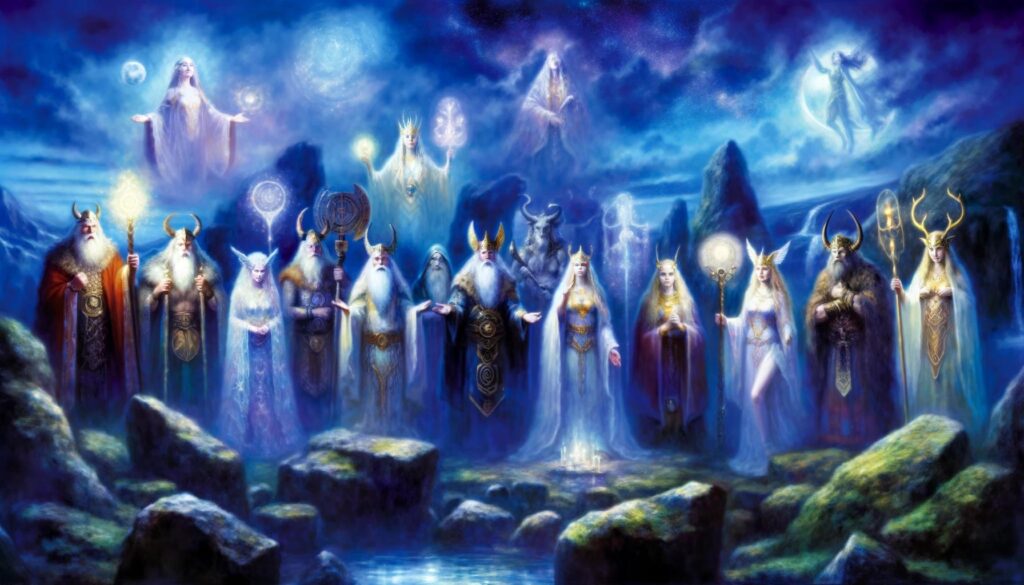
Fearsome Warriors and Wise Seers
- Odin: The Allfather, ruler of the gods, known for his wisdom and relentless pursuit of knowledge.
- Thor: The formidable god of thunder, protector of mankind, and defender against giants and creatures of chaos.
- Tyr: The brave and honorable god of war, renowned for his unwavering courage and sense of justice.
- Baldur: The radiant god of beauty and light, beloved by all and destined for a tragic fate.
Tricksters and Shapeshifters
- Loki: The mischievous shape-shifting god known for his cunning schemes, unpredictable nature, and misadventures.
- Freya: The enchanting goddess of love and beauty, also associated with war and magic.
- Freyr: The gentle god of fertility and abundance, beloved for bringing prosperity and bountiful harvests.
Goddesses of Fate and Wisdom
- Frigg: The wise and protective goddess associated with marriage, motherhood, and domestic affairs.
- Idun: The guardian of youth and keeper of the golden apples that grant eternal youthfulness to the gods.
- Skadi: The fierce and independent goddess of winter, the hunt, and mountains.
These are just a few examples of the fascinating viking gods that populate Norse mythology. Each deity brings its own tales, lessons, and symbolism, reflecting the values and beliefs of the Viking people.
Join us as we delve deeper into the world of the Viking god of fun and the joyous deities that bring laughter and merriment to Norse mythology.
Introduction to the Viking God of Fun
The Viking god of fun, also known as the Norse god of joy, is a divine being revered for their ability to bring laughter, happiness, and merriment to the world of the Norse. In Norse mythology, this deity holds a vital role in the pantheon, embodying the spirit of festivities and celebrations. Their presence is eagerly anticipated and celebrated during various festivals and gatherings.
With a mischievous nature and a contagious sense of humor, the Viking god of fun adds a lively and joyful energy to the tales and traditions of Norse mythology. Their vibrant personality is invoked to uplift spirits, spread laughter, and create an atmosphere of mirth and delight.
The Significance of the Viking God of Fun
The Viking god of fun plays a crucial role in Norse culture. The Norse people deeply value their ability to bring joy and amusement, as it provides an opportunity to momentarily escape the challenges and hardships of everyday life. Festivals and celebrations revolving around this deity serve as a reminder to embrace the lighter side of existence and to appreciate the simple pleasures that laughter and revelry can bring.
- Laughter as a unifying force: The presence of the Viking god of fun during festivals and gatherings brings people together, fostering a sense of unity and community. Laughter has the power to break down barriers, forge friendships, and create lasting memories.
- Balance and harmony: In the realm of Norse mythology, the Viking god of fun serves as a counterbalance to the more serious and intense aspects of the pantheon. Their joyful nature brings equilibrium and harmony to the divine realm and the mortal world.
- Inspiring creativity and spontaneity: The Viking god of fun sparks creativity and encourages spontaneity among the Norse people. Their influence can be seen in the arts, music, dance, and other forms of expression that celebrate joy and lightheartedness.
Through their presence and influence, the Viking god of fun reminds us of the importance of finding joy and laughter in our lives, even in the face of adversity. Their playful spirit inspires and uplifts, transcending cultural boundaries and leaving a legacy of happiness for generations to come.
Name and Attributes of the Viking God of Fun
The Viking god of fun brings joy and laughter to the world of Norse mythology. Various names know this playful deity, each representing a different aspect of their fun-loving nature. Let’s take a closer look at the attributes and characteristics associated with this lively god, painting a vivid picture of their role in Viking culture.
- Byggvir: This name embodies the mischievous and playful nature of the Viking god of fun. Byggvir is often depicted as a jovial companion, always ready to bring laughter and merriment to those around.
- Loki: Known for their quick wit and cunning, Loki is another name associated with the god of fun. Loki’s infamous pranks and tricks add an element of surprise and amusement to Norse mythology.
- Ægir: As the god of the sea, Ægir brings the joy of laughter and the festivities associated with the bountiful oceans. This aspect of the Viking god of fun is often celebrated during grand feasts and gatherings.
The Viking god of fun is characterized by their ability to lighten the spirits of those around them. Through their playful nature and whimsical antics, they embody the joyous essence of Norse culture.
Celebrations and Festivals in Honor of the Viking God of Fun
The Viking god of fun is revered and celebrated through a variety of joyous gatherings and festivals in Norse culture. These festivities aim to honor the spirit of merriment and bring forth the essence of the god’s joyful presence. Let us explore some of the rituals, traditions, and customs associated with these vibrant celebrations.
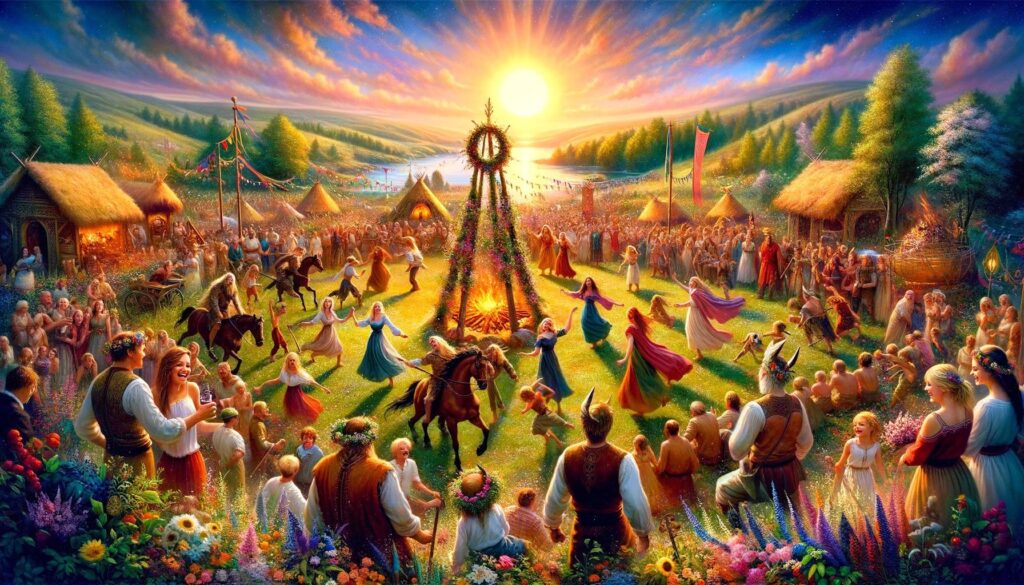
Honoring the Viking God of Fun: Rituals and Traditions
- During the summer solstice, a grand celebration known as Midsummer is held to pay homage to the Viking god of fun. This festival marks the peak of summer and is characterized by dancing, singing, and feasting.
- The Festival of Laughter, dedicated to the god of fun, occurs during harvest season. People gather to share jokes, engage in humorous performances, and revel in the spirit of laughter.
- Annual gatherings called Gjallarhorns are organized to celebrate the god’s playful nature. These events often include lively music, comedic performances, and friendly competitions.
Celebratory Customs and Festive Traditions
Various customs and traditions are observed during these celebratory events:
- Participants wear colorful costumes adorned with vibrant feathers and elaborate masks to reflect the playful and festive atmosphere.
- Dance rituals, such as the traditional Glee-dance, are performed to invoke the god’s joyful energy and encourage community bonding.
- Feasting plays a significant role in the festivals. People gather to share delicious meals and raise a toast to the Viking god of fun, celebrating life’s joyful moments.
These celebrations remind people of the god’s presence and the importance of laughter and enjoyment in Norse culture. They bring people together, foster a sense of community, and emphasize the value of happiness and lightheartedness in their daily lives.
Legends and Stories of the Viking God of Fun
Norse mythology is filled with captivating stories and legends surrounding the Viking god of fun. These tales have been passed down through generations, vividly depicting the mischief, humor, and revelry associated with this joyous deity.
The Pranks and Jokes of Loki
One of the most well-known stories involving the Viking god of fun centers around the mischievous Loki. Known for his cunning and tricks, Loki’s pranks often brought laughter and amusement to both gods and mortals alike. Whether it was transforming into different animals or playing practical jokes on his fellow deities, Loki’s antics added a touch of light-heartedness to the mythological narratives.
The Feast of Ullr
Another legendary tale celebrating the Viking god of fun is the Feast of Ullr. Ullr, the Norse god associated with hunting, skiing, and archery, was also renowned for his love of festivities. According to the stories, Ullr would lead his followers in joyous celebrations filled with feasting, music, dancing, and various games. These merry gatherings were believed to bring good fortune and prosperity to those who participated.
The Laughter of Freya
Freya, the goddess of love and beauty, also had her fair share of stories that showcased her joyful nature. In Norse mythology, Freya was often depicted as a radiant and vivacious figure who brought joy and laughter wherever she went. Her laughter was said to fill the air with infectious merriment, lifting the spirits of those around her and infusing their lives with joy.
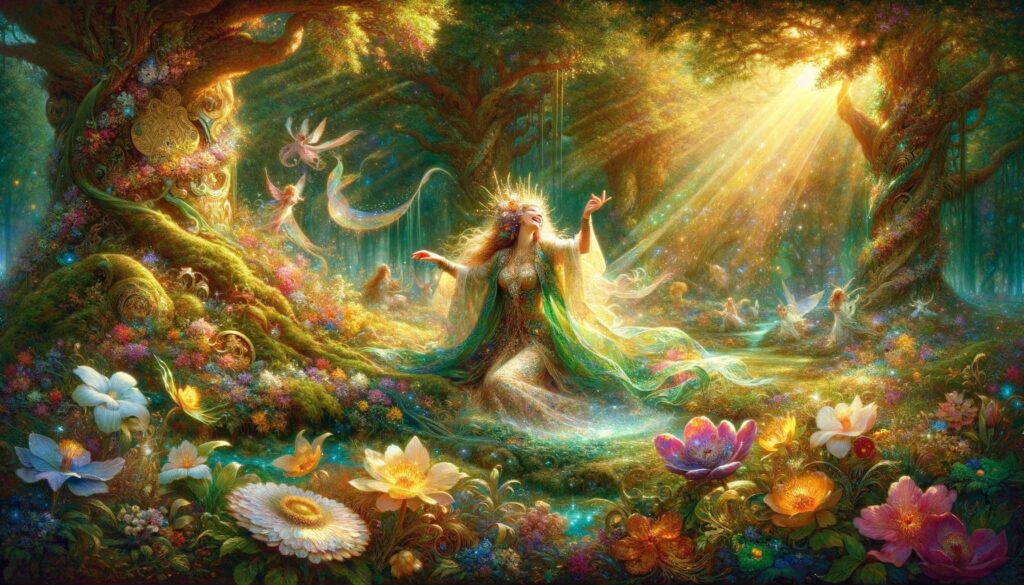
The Adventures of Thor
No discussion of Norse mythology would be complete without mentioning Thor, the mighty god associated with thunder and lightning. While Thor is primarily known for his strength and heroic endeavors, he also displayed a jovial side on various occasions. Whether it was engaging in friendly competitions or bouts of hearty laughter, Thor’s joyful presence added a lively element to the tales of gods and heroes.
The Feast of Valhalla
Valhalla, the grand hall of the gods in Norse mythology, was believed to host many joyous feasts and celebrations. These gatherings would bring together the fallen warriors who had been chosen to reside in Valhalla. The Viking god of fun often played a role in these festive occasions, ensuring that the warriors’ spirits were uplifted through mirth and revelry.
Throughout Norse mythology, the legends and stories of the Viking god of fun highlight the importance of laughter, mischief, and celebrations in Viking culture. These tales remind us of the joyous spirit that the ancient Norse people cherished.
Depictions of the Viking God of Fun in Art and Literature
Throughout history, artists and writers have captured the essence of the Viking god of fun through their creative endeavors. These visual representations and literary works give us glimpses into the joyous nature of this deity and its significance in Norse culture.
Artists have depicted the viking god of fun in multiple forms, reflecting the playful spirit and festivities associated with this divine figure. Paintings, sculptures, and illustrations have brought these joyful deities to life, showcasing their mischievous smiles, twinkling eyes, and exuberant laughter.
Literature has also played a crucial role in immortalizing the viking god of fun. Poems, stories, and sagas narrate the deity’s exploits and adventures, engaging readers in tales filled with humor, wit, and celebration. These written works allow us to delve deeper into the mythological world of the Vikings and appreciate the enduring legacy of the viking god of fun.
Visual Representations:
- Frescoes and murals depicting lively and vibrant festivities featuring the viking god of fun
- Illustrations in ancient manuscripts showcasing the god’s joyous presence at celebratory events
- Sculptures and statues capture the god’s charismatic and lively personality
Literary Works:
- Epics and poems celebrating the mirth and merriment brought by the viking god of fun
- Sagas and legends depicting the deity’s jovial interactions with other gods and mortals
- Anthologies compiling humorous anecdotes and tales associated with the viking god of fun
Influence of the Viking God of Fun in Modern Culture
The Viking god of fun, also known as the Norse god of joy, continues to influence modern culture. This deity, with his jovial nature and love for merriment, has inspired a variety of entertainment, humor, and joyous celebrations that bring smiles to people’s faces.
Entertainment:
From books to movies, the Viking god of fun has inspired numerous works of entertainment. Characters based on this deity often embody the spirit of laughter and mischief, making audiences chuckle and brightening their day.
Humor:
The Viking god of fun’s essence of humor has influenced stand-up comedy routines, comedy clubs, and comedic performances worldwide. Comedians draw from the wellspring of laughter associated with this deity to bring joy and amusement to their audiences.
Joyous Celebrations:
The Viking god of fun is honored and celebrated in many festivals and gatherings with cheerful and vibrant traditions. People come together to embrace this deity’s joyous spirit through lively music, dancing, and games, creating an atmosphere filled with laughter and pure delight.
The vibrant legacy of the Viking god of fun lives on, reminding us of the importance of laughter, entertainment, and festivities in our lives. Whether through entertainment, humor, or joyous celebrations, this deity continues to inspire and bring happiness to people around the world.
Other Norse Gods of Joy and Festivities
While the Viking god of fun is renowned for bringing joy and merriment to Norse culture, other gods and goddesses are associated with celebrations and happiness.
1. Freyja:
As the goddess of love, beauty, and fertility, Freyja embodies the joyous and pleasurable aspects of life. She is revered for her ability to bring happiness and fulfillment to all who seek her blessings.
2. Baldr:
Known as the god of light, innocence, and purity, Baldr is associated with joy and happiness. His presence brings harmony and peace, spreading laughter and cheer among the gods and mortals alike.
3. Sif:
Sif, the golden-haired goddess, represents fertility and abundance’s nurturing and joyful aspects. She is celebrated for bringing prosperity, laughter, and joy to the earth, ensuring bountiful harvests and joyous festivities.
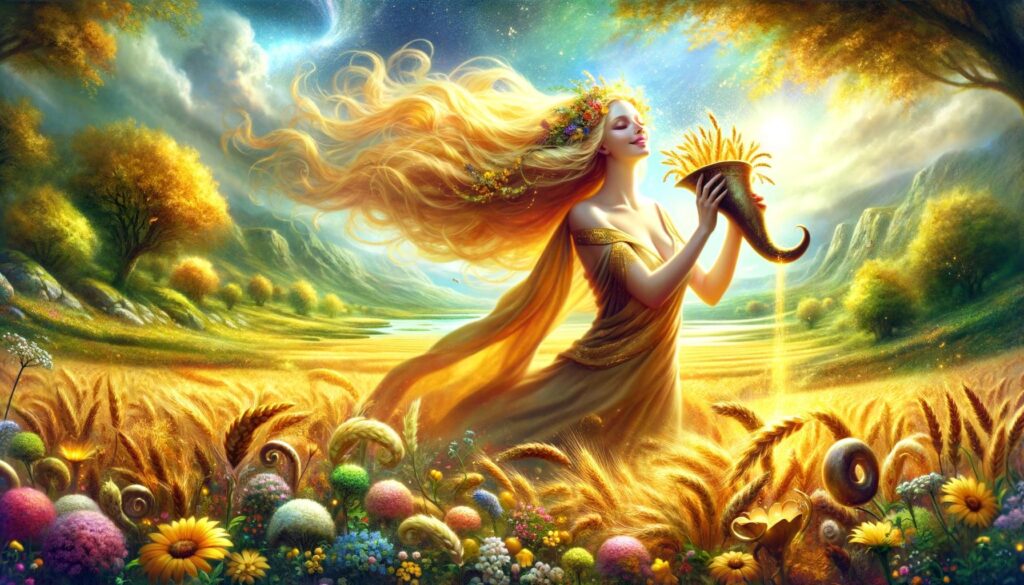
4. Idun:
Idun is the goddess of youth and vitality, symbolizing eternal joy and an evergreen spirit. She is responsible for preserving youthfulness and rejuvenating the gods, ensuring perpetual happiness and bliss.
These gods and goddesses, along with the Viking god of fun, contribute to the vibrant and joyous spirit of the Viking people, filling their lives with celebration, laughter, and happiness.
Summary
Throughout our journey into Norse mythology, we have delved deep into the realm of the Viking god of fun and the joyful deities that reside in this rich pantheon. The mirthful presence of these gods played a crucial role in Viking culture, adding laughter and delight to their lives.
Though centuries have passed since the Vikings’ heyday, the legacy of the Viking god of fun and their fellow deities continues to transcend time. Their influence can still be felt today as we honor and embrace the spirit of merriment and celebrations.
From elaborate festive gatherings to joyous rituals, the worship and reverence for the viking god of fun and other Norse gods of joy remain alive in modern culture. Whether through art, literature, or entertainment, their stories and attributes captivate our imagination and invite us to embrace the importance of laughter and playfulness in our own lives.
As we bid farewell to the world of Norse mythology, let us carry with us the spirit of the viking god of fun, forever reminding us of the importance of mirth, joy, and festive celebrations. May the legacy of these gods continue to bring laughter and delight to our lives, just as they did for the Vikings of old.

